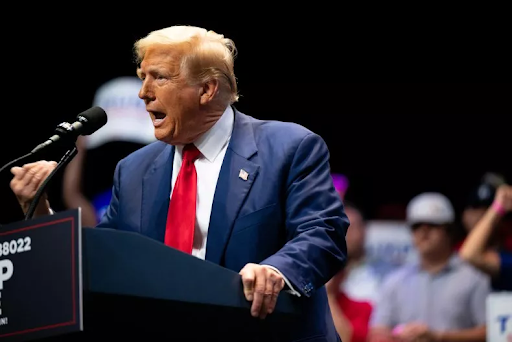- Get link
- X
- Other Apps
- Get link
- X
- Other Apps
Several judges on the New York Appellate Court have suggested the possibility of overturning the $489 million fraud judgment against Donald Trump.
During oral arguments on Thursday, one judge described the case as "troubling" and raised concerns about potential "mission creep."
In the initial trial, Judge Arthur Engoron determined that Trump, along with his adult sons Donald Jr. and Eric, and The Trump Organization, were liable for a scheme that involved unlawfully inflating Trump's net worth and assets to secure more advantageous business deals. As a result, Trump was ordered to pay a substantial fine of $464 million and was barred from engaging in New York's real estate sector for three years. This amount has since increased to $489 million due to accrued interest.
Donald Trump Jr. and Eric Trump were each ordered to pay over $4 million and were prohibited from conducting business in New York for two years.
Trump, the Republican presidential nominee, has consistently asserted his innocence. His legal team is now presenting their case before the New York Appellate Court, aiming to overturn the earlier judgment.
During Thursday's proceedings, the five-judge appellate panel interrogated Deputy New York Solicitor General Judith Vale regarding the absence of identifiable victims in the case and the substantial penalty imposed on Trump.
"The immense penalty in this case is troubling," Justice Peter Moulton remarked to Vale. "How do you relate the amount assessed by the Supreme Court to the harm caused here when all parties involved in these transactions appeared satisfied?"
Vale responded by acknowledging the significant fine, attributing it to the extent of the fraud and illegality involved. "That is a considerable advantage they gained from this conduct," she emphasized.
Moulton raised concerns about "mission creep," a term defined by Merriam-Webster as the gradual expansion of the original objectives of a mission or organization.
"There must be some limitations on what the attorney general can do regarding interference in these private transactions... where no one claims to have been harmed. So what is the limiting principle?" Moulton inquired.
Vale clarified that the transactions must be "related and relevant to the business at hand, and they must have a capacity or tendency to deceive." She added that "hidden risks" ultimately harm the market and honest participants.
Justice Llinet Rosado questioned how the New York attorney general calculated the disgorgement amount Trump was required to pay back.
Vale explained that this figure was based on the real interest Trump would have incurred on bank loans had he been truthful in his loan applications.
On August 22, New York Attorney General Letitia James submitted her counter-argument to Trump's appeal, asserting that the trial judge in New York's Supreme Court was fully convinced of the fraud committed by Trump and his organization.
"Following an eleven-week bench trial, the Supreme Court issued factual and credibility findings, concluding that the defendants had engaged in criminal, illegal conduct," they stated.
- Get link
- X
- Other Apps

Comments
Post a Comment